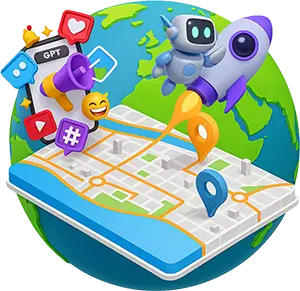Unlocking the Potential: AI Automation for Small Business Growth
Artificial Intelligence (AI) is no longer a futuristic concept reserved for large corporations. Today, AI automation for small business growth is transforming how entrepreneurs run and scale their enterprises. From automating repetitive tasks to enhancing customer experiences, AI-powered tools are empowering even the smallest teams to compete on a global scale. This is particularly important in an era where efficiency, creativity, and speed can be the determining factors of success.
But how exactly can AI drive small business growth? In this article, we’ll explore practical applications, actionable examples, and expert tips to help you integrate AI into your daily operations. Whether you’re a solopreneur or leading a growing team, there’s never been a better time to embrace AI automation.
Why AI Automation is a Game-Changer for Small Businesses
Small businesses operate under unique constraints—limited budgets, small teams, and ever-mounting competition. Traditional methods of scaling often demand significant resources, leaving many entrepreneurs struggling to keep up. However, advances in AI automation have broken down these barriers.
AI tools can now perform tasks that once required entire departments. Think about automating customer support through chatbots, or using AI to streamline email marketing campaigns. These capabilities not only save time but also improve accuracy, leaving business owners free to focus on growth-oriented goals.
For example, a small bakery that implements AI tools for order tracking and online customer inquiries can reduce errors and deliver seamless customer service. Similarly, a freelance graphic designer might use AI-powered design tools to quickly generate client-ready mockups. These efficiencies can make the difference between merely surviving and thriving in the competitive small business space.
Moreover, AI is no longer prohibitively expensive or complicated to use. Affordable, user-friendly platforms now cater specifically to small business owners, democratizing access to AI automation. This levels the playing field, enabling smaller companies to compete with established players on quality, speed, and personalization.
The Key Benefits of AI Automation
- Cost Savings
AI automation significantly reduces the need to hire additional staff for repetitive tasks, such as data entry or customer inquiries. Automated processes free up resources that can be reinvested in other areas of business growth. - Improved Productivity
By automating mundane tasks, team members can focus on strategic priorities. For example, AI-powered scheduling tools take over calendar management, giving employees more time to focus on creative or strategic projects. - Enhanced Customer Experience
AI personalization tools analyze user data to deliver customized recommendations and experiences. For businesses wanting to build strong customer relationships, this is an invaluable advantage. - Error Reduction
Manual work is prone to errors that can derail projects or cause friction with customers. AI systems bring a level of precision that ensures smoother operations.
Practical Applications of AI Automation for Small Business Growth
Adopting AI doesn’t require a complete overhaul of your operations. Many tools are designed to seamlessly integrate with existing workflows. Here are a few key applications to consider:
1. Customer Support Powered by AI
Whether you run an online store or offer professional services, responsive customer communication is crucial. AI chatbots like ChatGPT or Zendesk Answer Bot can handle common inquiries 24/7, ensuring prompt and accurate responses.
For example, an AI chatbot can handle frequently asked questions about your products, from shipping details to return policies. When more complex issues arise, the bot can automatically escalate the case to a human representative, ensuring a smooth handoff.
2. Automating Marketing Campaigns
Marketing can be a time-consuming function for small businesses. Fortunately, AI tools like Mailchimp and HubSpot excel at streamlining campaigns. These platforms use machine learning to personalize email content, predict optimal send times, and target specific audience segments.
For instance, a boutique clothing store might use AI to analyze customer purchasing patterns. Based on this data, automated campaigns could be created to suggest similar items or notify customers about upcoming sales, increasing conversion rates.
3. Inventory Management and Operations
Managing inventory is another area where AI can shine. Tools like TradeGecko or ShipBob help small businesses track inventory levels, forecast demand, and automatically reorder stock when it runs low.
A coffee shop, for example, could benefit from AI-enriched POS systems that alert the owner when coffee beans or cups need restocking. In addition, AI offers predictive analytics, helping entrepreneurs prepare for seasonal spikes in demand.
4. Content Creation Made Easy
Businesses that rely on content marketing can tap into AI tools like Jasper AI or Grammarly. These tools generate blog posts, social media captions, and email content faster while maintaining quality and tone.
Imagine a small digital marketing agency using AI to quickly draft ad copy for multiple clients while meeting tight deadlines. The time saved translates into better creativity and overall agency efficiency.
How Entrepreneurs Can Use GPT-Powered AI Today
General-purpose language models, such as ChatGPT, have introduced unprecedented flexibility into small business automation. Here’s how to make the most of such tools:
1. Generate Top-Notch Email Campaigns in Minutes
Prompt: “Write a personalized email to customers announcing a 20% discount for our anniversary sale. Include a sense of urgency.”
2. Craft Social Media Posts That Engage
Prompt: “Create a fun Instagram caption for a bakery launching a new strawberry cake.”
3. Efficient Meeting Summaries
Prompt: “Summarize key points discussed in a team meeting about improving customer retention.”
4. Create Customer FAQ Pages Effortlessly
Prompt: “Draft a list of five frequently asked questions for a small online furniture shop. Include concise answers.”
5. Analyze Customer Feedback for Insights
Prompt: “Analyze and summarize key themes from 100 customer reviews for a coffee subscription service.”
By leveraging GPT-powered tools, small businesses can effectively reduce workloads while maintaining a professional edge.
The Road Ahead: AI as a Growth Driver
Adopting AI automation for small business growth is not just a competitive advantage—it’s becoming a necessity. Businesses that embrace this technology now will find new opportunities to innovate, scale, and adapt to market changes. As tools become even smarter and more affordable, small businesses will continue to reap the rewards of increased efficiency and customer satisfaction.
While transitioning to AI-powered processes may feel intimidating at first, the long-term benefits far outweigh the initial learning curve. The key is to start small, prioritize tasks with a high return on investment, and build from there. Successful integration not only saves time but also transforms the way your business operates, paving the way for sustained growth.










0 Comments